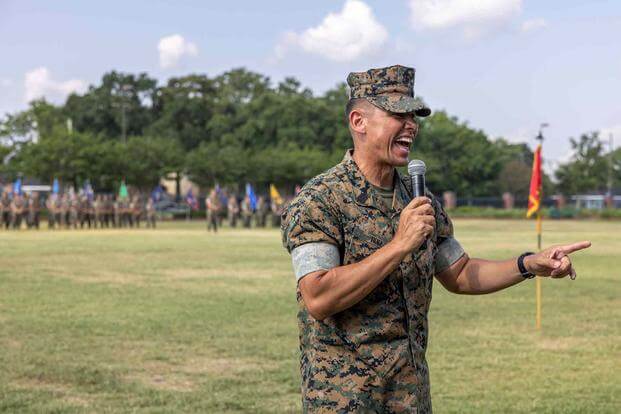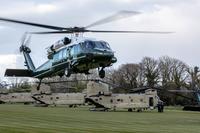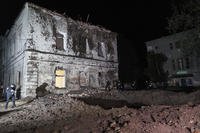Sgt. Maj. Carlos Ruiz faced his first meeting with a group of reporters this week since the Marine Corps selected him to be its top enlisted leader in June.
Reporters peppered Ruiz with questions about his upbringing in the Marine Corps, service member mental and physical health, political topics, and what young Marines might expect in America's new era of conflict post-Global War on Terror.
"I am a warehouse clerk," Ruiz told reporters Tuesday. "But being a warehouse clerk, that doesn't mean that I didn't think of myself as a Marine first."
Read Next: Veteran Advocates Sue over 'Discriminatory' Fertility Treatment Policies at DoD, VA
Many questions were answered, though at least one -- whether he would allow beards in the Corps -- was an issue to "stay away from," at least for now, he added. It was clear, however, that Ruiz wanted to tell his story and that he believes other Marines should do the same.
"But that also means telling when things went bad," he said, urging leaders to share their stories and how they overcame negative experiences.
Ruiz is entering the job during a transition within the Marine Corps. The service is making the major shift from insurgencies in the Middle East to competition in the Indo-Pacific against China. Logistics, personnel, technology and training are all on the table for "experimentation," according to service doctrine, though the amphibious nature of the Corps remains at its heart.
"There is much to be done," the doctrine says.
Meanwhile, the Marine Corps is without a congressionally confirmed commandant for the first time in 164 years due to a legislative hold by Sen. Tommy Tuberville, R-Ala., who objects to the Pentagon's policy allowing leave for abortion services.
Ruiz takes the mantle of sergeant major of the Marine Corps on Aug. 10, likely without a confirmed officer counterpart.
On this, Ruiz told reporters, "I have a front row seat to what's happening. And what's happening is we continue to march. We continue to move forward."
He recalled coming to the U.S. from Sonora, Mexico, when he was 11 years old and having to catch up to English-speaking peers who were already accustomed to American culture. Before enlisting in the Corps in 1993 as a supply warehouse clerk, Ruiz remembered failing the Armed Services Vocational Aptitude Battery, a test to determine a prospective service member's military job, three times.
"I think if I were to take the ASVAB today, I'd probably be OK," he quipped.
That time in his life is one that he invokes when mentoring Marines, he said. He wants to tap into what it felt like for a Marine to take the Eagle, Globe and Anchor for the first time. Were you emotional? Did you cry?
"No, you probably shed a tear, right?" he said. "Because it felt like winning. And maybe some have not experienced the feeling of winning or accomplishing something."
In celebrating those wins, he said it is important to recognize the failures. He recalled a moment as corporal when a senior enlisted Marine picked him to call cadence on a run. Ruiz had been selected as the guidon bearer for his platoon -- a position he competed for -- but when called, he knew no cadence. And the platoon fell silent.
"That was an awakening for me to know because you have this rank on your collar that puts responsibility on you, you have that responsibility to get better every day and don't hide," he said.
Before the attacks on New York City's World Trade Center in 2001, Ruiz spent time in Japan; Barstow, California; and at a recruiting station in Los Angeles. A month after the Twin Towers fell, Ruiz reported to a supply company in the 1st Force Service Support Group.
"I was a staff sergeant when the towers fell," he recalled to reporters. Ruiz was fielding a question about what he would tell young Marines -- many of whom spent their entire lives watching a very kinetic Global War on Terror unfold on television -- who are joining a military focused on deterrence in the Pacific.
"So, the day will come -- may come," he said. "There was never a time that I remember [saying], 'Boy, I had too much time to prepare.' This is your prep time. ... It may be disaster relief, humanitarian, whatever it is. They're gonna get called somewhere."
The first time Ruiz was called to a combat zone was in 2003 when he deployed to Kuwait, from where he would then enter Iraq at the dawn of the invasion, according to his official Marine Corps biography.
The following year, Ruiz donned a campaign cover as a drill instructor in San Diego. By 2006, he had been a drill master, physical training instructor, and the Drill Instructor School's chief instructor.
"Don't be mad when I hold you to the standard that you wanted to be a part of," he recalled telling his Marines as a noncommissioned officer.
During the next decade, Ruiz deployed to Afghanistan twice as a first sergeant. In 2013, he was selected for sergeant major and held a number of logistics leadership roles at that rank.
In 2021, Ruiz served as both the enlisted leader of the U.S. Marine Corps Forces Reserve and U.S. Marine Corps Forces, South -- his penultimate assignments before the service selected him as sergeant major of the Marine Corps. He is the first sergeant major selected for the job in more than a decade who hails from a non-combat military occupational specialty, or MOS.
There were a number of things Ruiz indicated are on his radar. One is health -- spiritual, mental and physical. He cited a facility at Twentynine Palms, California, that has gyms, physical therapists, chaplains and other services centrally located for Marines to access.
"That's where we want to put some resources to," he said, though he recognized the challenge of replicating that one-stop-shop for the "total force."
He said that it is good the Marine Corps is looking at how body composition is measured. He also said that "we're always looking at the policies and orders" when asked about changes to tattoos, physical training and uniforms, but he did not specify details.
Ruiz said that the reporters were not the first to ask him about what he wants to change or fix about the Marine Corps. But he doesn't want to enter the position "with a thought that something needs to be fixed, because we've been doing pretty well for a long time."
He was hesitant to commit to any sweeping changes. However, he said that "the environment is telling us -- is compelling us -- to move faster at getting better resources to families." He listed barracks, medical care, pay, child care and housing as general quality-of-life efforts he hopes to bolster in order to make the all-volunteer force an environment that Marines want to stay in and prospective troops want to join.
"I want to listen first to the force," he said.
"It's not about what I'm going to change. It's what's not going to change, and that's really about knowing your job, respecting the standard, and striving every day to have a disciplined day," he said. "To be a little better than you were yesterday."
-- Drew F. Lawrence can be reached at drew.lawrence@military.com. Follow him on Twitter @df_lawrence.
Related: After a Spate of Rollovers, Marine Corps Graduates Retrained Amphib Vehicle Drivers













